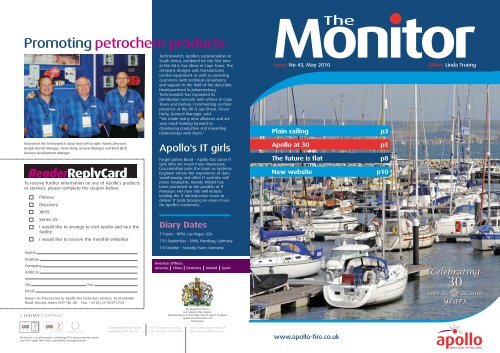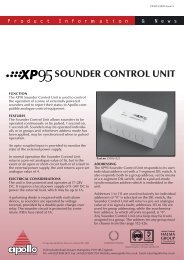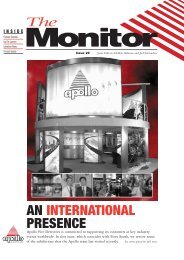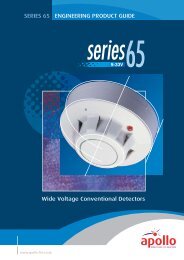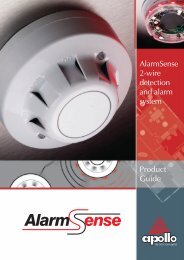Monitor 43 V1 (Page 1 - 2) - Apollo Fire Detectors Limited
Monitor 43 V1 (Page 1 - 2) - Apollo Fire Detectors Limited
Monitor 43 V1 (Page 1 - 2) - Apollo Fire Detectors Limited
You also want an ePaper? Increase the reach of your titles
YUMPU automatically turns print PDFs into web optimized ePapers that Google loves.
Promoting petrochem products<br />
Pictured on the Technoswitch stand, from left to right: Patrick Denyssen,<br />
Durban Branch Manager, Trevor Harty, General Manager, and Brett Birch,<br />
Business Development Manager.<br />
ReaderReplyCard<br />
To receive further information on any of <strong>Apollo</strong>’s products<br />
or services, please complete the coupon below:<br />
Name<br />
Position<br />
Company<br />
Address<br />
Plateau<br />
Discovery<br />
XP95<br />
Series 65<br />
I would like to arrange to visit <strong>Apollo</strong> and tour the<br />
facility<br />
I would like to receive the monthly e<strong>Monitor</strong><br />
Tel Fax<br />
Email<br />
Return to: Theresa Berry, <strong>Apollo</strong> <strong>Fire</strong> <strong>Detectors</strong> <strong>Limited</strong>, 36 Brookside<br />
Road, Havant, Hants PO9 1JR, UK. Fax: +44 (0) 23 9249 2754.<br />
Printed on a recycled paper containing 50% post-consumer waste<br />
and 50% virgin fibre from responsibly-managed forests.<br />
Technoswitch, <strong>Apollo</strong>'s representative in<br />
South Africa, exhibited for the first time<br />
at the Oil & Gas Show in Cape Town. The<br />
company designs and manufactures<br />
control equipment as well as providing<br />
customers with technical consultancy<br />
and support in the field of fire detection.<br />
Headquartered in Johannesburg,<br />
Technoswitch has expanded its<br />
distribution network with offices in Cape<br />
Town and Durban. Commenting on their<br />
presence at the Oil & Gas Show, Trevor<br />
Harty, General Manager, said:<br />
“We made many new alliances and are<br />
very much looking forward to<br />
developing productive and rewarding<br />
relationships with them.”<br />
<strong>Apollo</strong>'s IT girls<br />
Forget James Bond - <strong>Apollo</strong> has some IT<br />
girls who are much more impressive.<br />
Lisa Hamilton joins the team as Systems<br />
Engineer where her experience of data<br />
warehousing and other IT systems will<br />
prove invaluable. Mandy Wright has<br />
been promoted to the position of IT<br />
Manager. Her new role will include<br />
leading the IT infrastructure team to<br />
deliver IT tools focusing on ease of use<br />
for <strong>Apollo</strong>'s customers.<br />
Diary Dates<br />
7-9 June - NFPA, Las Vegas, USA<br />
7-10 September - SMM, Hamburg, Germany<br />
5-8 October - Security, Essen, Germany<br />
Overseas Offices:<br />
America China Germany Ireland Spain<br />
By Appointment to<br />
Her Majesty the Queen<br />
Manufacturers of <strong>Fire</strong> Detection & Alarm Products<br />
<strong>Apollo</strong> <strong>Fire</strong> <strong>Detectors</strong> Ltd<br />
Hampshire<br />
<strong>Monitor</strong><br />
The<br />
Issue: No <strong>43</strong>, May 2010 Editor: Linda Truong<br />
Plain sailing p3<br />
<strong>Apollo</strong> at 30 p5<br />
The future is flat p8<br />
New website p10<br />
www.apollo-fire.co.uk
Burning issues<br />
Danny Burns<br />
Managing Director<br />
NewsBytes<br />
TRIAL BY FIRE<br />
Hobart, Australia. <strong>Apollo</strong>'s reliability was put to the<br />
test when vandals broke into a new apartment<br />
complex recently and set fire to some building<br />
materials. As the apartment was still being fitted out<br />
and was not occupied, the XP95 ® smoke detector<br />
was programmed to act as a local only alarm. The<br />
device worked as intended, but was significantly<br />
damaged in the fire. When KNL <strong>Fire</strong> Systems<br />
inspected the detector, its LED was still indicating<br />
and, on de-isolating the warning system, the sounder<br />
still worked.<br />
APPROVALS<br />
<strong>Apollo</strong> has received Factory Mutual (FM) listing for<br />
a range of its products designed for the US market.<br />
These include Discovery UL ionisation, optical and<br />
heat detectors and the Discovery UL multisensor;<br />
the E-Z Fit base, low power relay base, isolating base,<br />
intelligent mounting base and six inch mounting base<br />
for use with XP95A devices; as well as the range of<br />
XP95A modules. Full details of the approvals held by<br />
all our products are available at<br />
www.apollo-fire.co.uk<br />
2<br />
Election fever will be over by the time you are reading this special issue of<br />
The <strong>Monitor</strong>. They say a week is a long time in politics - but 30 years in the<br />
fire industry is a real cause for celebration.<br />
So what has kept <strong>Apollo</strong> so strong through decades of economic, political and<br />
technological change? Well, we've always had a clear vision of where we<br />
were going. Even when the company was starting out, it aimed to lead from<br />
the front. When it comes to innovation, one of its proudest achievements was<br />
the introduction of the first analogue addressable fire detectors in the mid<br />
eighties. This set the foundation for the continuous innovation which has seen<br />
the company grow to be a world leader in fire detection solutions. On pages<br />
6 and 7, The <strong>Monitor</strong> celebrates the key technological milestones in <strong>Apollo</strong>'s<br />
history.<br />
We've also been careful to make sure that our values of excellent customer<br />
service and product reliability have been maintained as the company has<br />
grown. Our commitment to our customers remains as strong as when we<br />
started in 1980. Indeed, in many ways we have strengthened our support.<br />
One example is our commitment to establishing direct <strong>Apollo</strong> offices on every<br />
continent. Another is our recent investment in a new, integrated business<br />
system that will make us more efficient than ever in looking after our<br />
customers.<br />
So, wherever you are in the world, rest assured that <strong>Apollo</strong> is just as<br />
committed now to helping you provide fire detection solutions to your<br />
customers as it has been for 30 years. We look forward to working closely<br />
with you in the decades to come.<br />
AND THE WINNER IS...<br />
Earlier this year, <strong>Apollo</strong> asked for participation in its<br />
online Customer Satisfaction Survey. Everyone who<br />
responded had the opportunity to be entered into a<br />
prize draw to win an iPod. We're delighted to<br />
announce that the lucky winner of the iPod is Paul<br />
Donaldson of Res <strong>Fire</strong> Ltd, Dublin. A very big thank<br />
you to everyone who took part. We're still processing<br />
the results of the survey, but rest assured that they<br />
will be used to improve our service to you in future.<br />
Which means, of course, that everybody wins!<br />
It's plain sailing with <strong>Apollo</strong><br />
Only the best fire detection would do for Portland Marina on the South<br />
coast of England, which will be one of the venues for sailing events during<br />
the 2012 Olympic and Paralympic Games.<br />
Situated at Weymouth, Dorset,<br />
Portland Marina offers berthing for<br />
vessels up to 44 metres in length<br />
and a full boatyard service,<br />
including lift-out and storage<br />
ashore. The berths are fully<br />
serviced, with water and electricity<br />
laid on, and there are also<br />
extensive shoreside facilities such<br />
as a washroom, a laundry and<br />
showers, as well as a free internet<br />
café, bar and restaurant.<br />
A fire detection system was<br />
required to provide constant<br />
protection at the site, including the<br />
marina facilities building, restaurant<br />
building, 13 business units and four<br />
boat workshops. Owners Dean &<br />
Reddyhoff Marinas awarded the<br />
contract to supply the fire<br />
protection to H W Smith & Son<br />
(Contracting) Ltd.<br />
David Smith, managing director of<br />
H W Smith & Son, explains: “As the<br />
site is manned 24/7 and the<br />
business units are let to tenants,<br />
we agreed on a solution based on<br />
<strong>Apollo</strong>'s conventional technology.<br />
This offers a number of benefits,<br />
including reduced costs, simplified<br />
future maintenance and<br />
adaptability to changes of use. We<br />
recommended <strong>Apollo</strong> because they<br />
have proved very reliable in the<br />
past.”<br />
“The system is very<br />
easy to use”<br />
The distributed fire detection<br />
system comprises 19 Channel <strong>Fire</strong><br />
control panels, varying from sixzone<br />
models in the main buildings<br />
to single zone models in the<br />
individual business units. A<br />
combination of <strong>Apollo</strong> Series 65 TM<br />
optical smoke detectors and fixed<br />
and rate-of-rise heat detectors has<br />
been used to meet the local<br />
environmental conditions. In<br />
addition to internal audio visual<br />
devices, the fire system includes<br />
18 IP65-rated sounder beacons,<br />
which are installed externally to<br />
communicate an alarm anywhere<br />
in the boatyard.<br />
Russ Levett, manager of Portland<br />
Marina, says: “The marina opened<br />
in April 2009 and we haven't<br />
required any technical or customer<br />
service support since then, other<br />
than routine maintenance.<br />
The system is very easy to use<br />
and we are very happy with its<br />
performance to date.”<br />
3
<strong>Apollo</strong> holds court<br />
<strong>Apollo</strong> fire detection technology has recently been installed at two court<br />
buildings in the UK as part of an ongoing programme of refurbishment by<br />
Her Majesty's Court Services (HMCS).<br />
Court buildings have some interesting fire detection<br />
requirements. As public access buildings,<br />
comprehensive fire protection is paramount. There<br />
are also areas like holding cells which may require<br />
special evacuation procedures in the event of an<br />
emergency.<br />
BIG IN BUCKS<br />
The Magistrate's Court in Milton Keynes,<br />
Buckinghamshire, has had a total upgrade to meet<br />
L1 requirements. The new intelligent fire system<br />
was installed by Network Security & <strong>Fire</strong>, based in<br />
Basingstoke.<br />
There was no possibility of closing the building while<br />
the upgrade was carried out, so installation of the<br />
new fire equipment took place out of hours. Around<br />
260 <strong>Apollo</strong> Discovery ® devices were used in total,<br />
including optical smoke and heat detectors, looppowered<br />
beacons, manual call points and interfaces.<br />
The fire system is configured around three networked<br />
Advanced Electronics control panels.<br />
John Angell, Contract Manager for Network <strong>Fire</strong><br />
& Security, says: “We would always recommend<br />
<strong>Apollo</strong> as part of a fire detection solution. Their<br />
open protocol allows us to choose exactly the right<br />
equipment for a project and tailor the solution to<br />
the client.”<br />
4<br />
COMBINED FORCES<br />
Maidstone Combined Court in Kent has also been<br />
equipped with a new <strong>Apollo</strong>-based fire detection<br />
system. The building was constructed in 1983 and<br />
houses both the Crown and County courts. Six storeys<br />
in height, the Court is most famous for the recent<br />
trial surrounding the £53 million Securitas depot raid<br />
in 2006, for which six people are currently serving<br />
sentences.<br />
The fire detection contract was awarded to R&M<br />
Clarkson, who were given a project time of just 10<br />
weeks. Neil Shrubsole, the company's Operations<br />
Director, explains: “Working to such a short timeframe,<br />
we needed to be certain that the equipment<br />
would arrive on site exactly when it was needed.<br />
We also needed assurance that the fire system was<br />
based on proven technology and that it would be<br />
reliable from day one. <strong>Apollo</strong> fulfilled every aspect of<br />
this brief and we had no hesitation in recommending<br />
their technology.”<br />
Maidstone Combined Court's new fire system uses<br />
in excess of 1500 devices, including 900 <strong>Apollo</strong><br />
Discovery fire detectors and multisensors. In addition,<br />
the building is equipped with more than 500<br />
Discovery audio-visual warning devices. The system<br />
is controlled using six networked Kentec control<br />
panels complete with graphical mimics.<br />
Left: The fire detection system at the Magistrate’s Court<br />
in Milton Keynes was fitted out of hours so the courts<br />
could continue to sit.<br />
Below: More than 900 <strong>Apollo</strong> Discovery fire detectors<br />
protect people at Maidstone Combined Court.<br />
Facing the future<br />
with confidence<br />
In May this year, <strong>Apollo</strong> <strong>Fire</strong><br />
<strong>Detectors</strong> will be 30 years old.<br />
The <strong>Monitor</strong> celebrates the past<br />
and looks forward to the future.<br />
World events of the last three decades include the fall<br />
of the Berlin Wall (1989), the election of the first black<br />
president in South Africa (1994) and the mapping of<br />
the human genome (2000). These events shaped the<br />
future - as we knew they would.<br />
In the world of fire detection, the influence that one<br />
small company might have in future is impossible to<br />
predict. So, when <strong>Apollo</strong> Manufacturing <strong>Limited</strong> came<br />
into being on 8th May 1980, no-one knew what the<br />
outcome would be. However, the 13-strong workforce<br />
had a clear vision that drove the company forward.<br />
<strong>Apollo</strong> believed in the products it was making. It also<br />
understood that, to gain market share, it had to offer<br />
excellent customer service and support. Based on these<br />
principles, the company developed rapidly. In 1984, it<br />
joined international engineering group Halma plc and<br />
was renamed <strong>Apollo</strong> <strong>Fire</strong> <strong>Detectors</strong> <strong>Limited</strong>. In 1986,<br />
it launched Series 90 - its first range of analogue<br />
addressable fire detectors - which became the market<br />
leading brand within two years.<br />
The 1990s saw <strong>Apollo</strong> grow further in stature and<br />
confidence, and it became the first fire detection<br />
company to obtain LPCB approval to BS5750 Part 2.<br />
Its achievements also began to gain recognition outside<br />
the industry. By 1995, <strong>Apollo</strong> had won an unprecedented<br />
third Queen's Award for Export Achievement.<br />
In 1996, with a new, purpose-built headquarters to work<br />
from, <strong>Apollo</strong> continued to consolidate its position as a<br />
market leader in the UK and abroad. It entered the<br />
marine fire detection market, as well as developing<br />
bespoke versions of its popular product ranges for major<br />
territories like the US.<br />
Today, with its products selling into over 100 territories<br />
worldwide, it might be difficult to see where the<br />
company can go next. However, its vision is as clear and<br />
focused as ever. <strong>Apollo</strong> continues to be committed to<br />
technological innovation. Its latest product developments<br />
are celebrated on page 8. The company is also<br />
committed to providing the best possible customer<br />
support and continues to invest in its business systems<br />
and its people to make sure it delivers excellence at<br />
every level.<br />
5
<strong>Apollo</strong>: past, present and future<br />
<strong>Apollo</strong> has been at the forefront of innovation in fire detection<br />
for 30 years. The <strong>Monitor</strong> looks at what has gone before, and<br />
where it is likely to lead us in the future.<br />
In 1980, when <strong>Apollo</strong> first opened<br />
for business, the choice of fire<br />
detection technology was simple:<br />
ionisation sensors were used for<br />
smoke detection and thermistors<br />
for detecting heat. The company's<br />
first detectors, the Mark I and Mark<br />
II, were ionisation smoke detectors.<br />
Within four years, <strong>Apollo</strong>'s flair for<br />
innovation became apparent with<br />
the introduction of Series 30: a new<br />
design of ionisation smoke detector<br />
that radically reduced the size of the<br />
radioactive source without<br />
compromising performance and so<br />
made transportation and storage<br />
much safer. The design of the Series<br />
30 detector was also new, being<br />
very neat and compact in<br />
appearance.<br />
<strong>Apollo</strong> added an optical fire detector<br />
to its product offering in 1984.<br />
Series 90 TM , the company's first full<br />
range of fire detectors, followed in<br />
1986. This range - the first to use<br />
6<br />
analogue addressable technology -<br />
was a milestone for the industry as<br />
well as <strong>Apollo</strong>, and quickly became<br />
the market leader. The protocol<br />
used in Series 90 forms the basis<br />
for every subsequent <strong>Apollo</strong><br />
analogue addressable product.<br />
Although Series 90 effectively<br />
established <strong>Apollo</strong> as a serious<br />
contender, the company did not rest<br />
on its laurels. Its ongoing research<br />
and development programme was<br />
already working on the next<br />
generation of fire detectors. The<br />
results were the Series 60 TM range<br />
of low profile conventional fire<br />
detectors and the XP95 range of<br />
analogue addressable devices. The<br />
latter featured another piece of<br />
technological genius: the patented<br />
XPERT address card.<br />
As a means of programming in<br />
individual addresses, the XPERT card<br />
is a simple but elegant solution to<br />
what was a complex problem.<br />
Rather than<br />
use increasingly<br />
sophisticated or<br />
computer-based<br />
methods, <strong>Apollo</strong><br />
returned to first<br />
principles to produce<br />
this purely mechanical<br />
and virtually foolproof<br />
means of addressing<br />
devices. Its popularity has<br />
meant that the XPERT card<br />
continues as part of the<br />
Discovery range, the natural<br />
successor to XP95.<br />
Developing technology to meet - or<br />
even exceed - market expectations<br />
continues to this day. So, what can<br />
we expect from innovators like<br />
<strong>Apollo</strong> in the future? One area<br />
currently being researched is the<br />
adoption of sensor technologies<br />
from other industries - particularly<br />
semiconductor-based sensors.<br />
Having proven themselves reliable<br />
in other arenas, particularly in the<br />
detection of toxic and combustible<br />
gases, there is strong interest in<br />
transferring this sensor technology<br />
to fire detection applications.<br />
Other projects include overcoming<br />
the technical issues associated with<br />
making fire detectors 'invisible'.<br />
While many products have been<br />
miniaturised in recent years, this is<br />
not a practical option for smoke<br />
detectors because the sensor<br />
chamber needs to be large enough<br />
to allow particles in. However,<br />
making fire detectors more discreet<br />
and low profile to meet aesthetic<br />
requirements is not only possible -<br />
it is about to become a reality. For<br />
your first taste of the future<br />
according to <strong>Apollo</strong>, turn to page 8.<br />
“We celebrate the past to<br />
awaken the future”<br />
John F Kennedy
The future is...flat<br />
<strong>Apollo</strong> has unveiled its latest innovation - the slimline Plateau ®<br />
fire detector.<br />
Plateau is the supermodel of the fire detection<br />
world. Its ultra-thin profile has been developed for<br />
applications where it is impractical or undesirable<br />
to use a standard smoke detector. Standard fire<br />
detectors can be seen by some architects as<br />
obtrusive, but specifying Plateau means that interior<br />
designs are not compromised by the 'lump on the<br />
ceiling'. Alternatively, the interior could be a heritage<br />
building with unique features that need to be<br />
preserved in appearance.<br />
The patented Plateau is flush-mounted and fits into a<br />
hole in the ceiling so that only the plastic cover plate<br />
is visible. The flat profile is possible because these<br />
smoke detectors do not have an internal smoke<br />
chamber - instead combustion products are detected<br />
outside the device itself.<br />
Plateau operates as an optical detector, but the light<br />
beam is transmitted through the cover plate and<br />
reflected by any smoke close to it. The light that is<br />
reflected is registered by a receiver in the detector,<br />
which will change to the alarm state if the presence<br />
of smoke is confirmed.<br />
8<br />
Features include permanent checking for<br />
contamination on the cover plate and automatic<br />
adjustment of the alarm threshold as required to<br />
compensate. The device will raise a fault condition if<br />
contamination is excessive. There is also an inbuilt<br />
self-test facility.<br />
Requiring its own DC power supply, the Plateau<br />
detector is connected to an XP95 or Discovery loop<br />
by means of a Zone <strong>Monitor</strong> or DIN-rail Zone <strong>Monitor</strong>.<br />
<strong>Apollo</strong> has also developed a special vandalresistant<br />
version of Plateau for applications<br />
where standard fire detectors could be a<br />
hazard. Examples include prison cells, detention<br />
centres and secure units in hospitals. This<br />
device features a 4mm stainless steel plate<br />
instead of the standard plastic cover, but is<br />
identical in other aspects to the standard<br />
version.<br />
Far left: Plateau – the future of<br />
fire detection<br />
Left: The vandal-resistant<br />
version of Plateau<br />
Below: The slimline Plateau<br />
will not compromise modern<br />
interior design<br />
<strong>Apollo</strong> has been chosen to protect<br />
Portsmouth Guildhall following a major<br />
review of fire strategy. The contract was<br />
awarded to Christie Intruder Alarms (CIA)<br />
Ltd, an approved supplier for Portsmouth<br />
City Council.<br />
The Guildhall is situated in the centre of<br />
Portsmouth and dominates Guildhall<br />
Square. Following extensive damage<br />
caused by bombing during World War II,<br />
the building was rebuilt during the 1950s.<br />
Today it is used as an entertainment and<br />
conference centre, as well as housing The<br />
Coroner's Office, the Council Chamber and<br />
Mayoral Suite.<br />
There were a number of challenges for the<br />
new fire system. In some areas, such as<br />
the Mayoral Chambers and banqueting<br />
facilities, architectural considerations<br />
precluded the use of standard hard-wired<br />
devices. There was also the need for<br />
flexibility, to cope with the multi-use<br />
nature of the site.<br />
Using <strong>Apollo</strong> technology, Christie Intruder<br />
Alarms was able to select products to<br />
deliver a fully compatible fire system that<br />
did not compromise on performance or<br />
reliability. <strong>Apollo</strong>'s analogue addressable<br />
XP95 and Discovery devices form the basis<br />
of the fire protection system.<br />
Some 600 XP95 devices were used to<br />
protect the main areas of the building,<br />
while Discovery ionisation detectors were<br />
used in areas where there was the<br />
possibility of smoke entrainment. Those<br />
installed at the Guildhall are set to Mode 4,<br />
so that their sensitivity levels are<br />
appropriate to the risk in these areas.<br />
Beam detectors were used in the<br />
auditorium roof void, high level plant<br />
rooms and the Council Chamber. For the<br />
heritage areas, Christie Intruder Alarms<br />
used <strong>Apollo</strong>'s wireless XPander range.<br />
A key switch facility enables the stage<br />
manager to switch the smoke detectors in<br />
the auditorium to 'heat only' mode when<br />
smoke generators are in use. Operating<br />
the key switch also isolates the high level<br />
beam detectors in the roof void. A second<br />
key switch facility controls the door hold<br />
open devices around the auditorium.<br />
The fire system is configured in 32 zones<br />
and controlled by an eight-loop Advanced<br />
Electronics MX 400 control panel. The<br />
system is monitored at the ground floor<br />
reception and by front-of-house staff<br />
during functions. Interfaced with it is a<br />
Scope emergency pager system that alerts<br />
designated staff if an alarm is raised so<br />
they can investigate incidents prior to an<br />
evacuation being initiated. <strong>Fire</strong> cover was<br />
maintained throughout the changeover.<br />
<strong>Apollo</strong> protects<br />
Portsmouth<br />
Guildhall from<br />
fire<br />
9
New<br />
website<br />
improves<br />
customer<br />
support<br />
Following a detailed review of customer<br />
needs, <strong>Apollo</strong> has completely revised its<br />
website. The new website is launching at<br />
the end of May 2010 and contains a whole<br />
host of new features that are designed to<br />
give our customers more support online<br />
than ever before.<br />
The new website features an extranet<br />
called <strong>Apollo</strong> Plus. With a unique log-in<br />
and password, customers can now take<br />
advantage of a new project area where<br />
they can store the documents they have<br />
downloaded from the site. This makes<br />
finding the information again so much<br />
quicker. Customers will also have the<br />
ability to bookmark pages in their area<br />
and those with a trademark agreement<br />
can also access unlocked literature and<br />
photos instantly. Users of <strong>Apollo</strong>’s current<br />
extranet site will be able to use their<br />
existing log-ins to access the new <strong>Apollo</strong><br />
Plus service.<br />
One major improvement is an enhanced<br />
search function, which allows users to<br />
filter results by product range, category,<br />
market application or approvals. Product<br />
information can also be browsed using<br />
these categories, helping you to locate<br />
exactly the right product to meet a<br />
specification.<br />
There is also an online video<br />
demonstration to guide you through the<br />
new website, showcasing all these<br />
enhanced features and more. Why not<br />
take a look and see for yourself? Visit<br />
www.apollo-fire.co.uk today.<br />
10<br />
<strong>Apollo</strong> provides<br />
presidential protection<br />
A new <strong>Apollo</strong> fire detection system has been installed at the Palàcio<br />
do Planalto in Brasilia, the official workplace of the President of Brazil.<br />
A new <strong>Apollo</strong> fire detection<br />
system has been installed at the<br />
Palàcio do Planalto in Brasilia, the<br />
official workplace of the President<br />
of Brazil, by Ezalpha MV.<br />
The Palàcio do Planalto is a<br />
landmark building situated in the<br />
heart of Brazil's capital city. It dates<br />
back to the planning and<br />
development of Brasilia in 1956<br />
and was designed by Principal<br />
Architect Oscar Niemeyer to<br />
showcase modern building<br />
materials such as concrete and<br />
glass. Along with other original<br />
buildings in Brasilia's centre, it<br />
forms part of a UNESCO world<br />
heritage site.<br />
Marcelo B de Vasconcellos, Director<br />
of Ezalpha MV, said: “Ezalpha MV is<br />
very proud of its work at the<br />
Palàcio do Planalto, which will<br />
protect part of our national<br />
heritage. We won this fire<br />
detection contract through a<br />
combination of our own<br />
experience, the quality of <strong>Apollo</strong>'s<br />
products and because they held all<br />
the right certifications, thus<br />
meeting the client's specification.”<br />
Ezalpha MV recommended a fire<br />
system based on <strong>Apollo</strong>'s<br />
analogue addressable technology.<br />
Key features include flexible<br />
system configuration; continuous<br />
confirmation of system integrity; a<br />
pre-alarm to help reduce false<br />
alarm incidents; and verification of<br />
alarm levels to further reduce false<br />
alarms.<br />
These features were of particular<br />
importance at the Palàcio do<br />
Planalto because it was essential<br />
to provide continuous and<br />
comprehensive fire protection,<br />
while ensuring that affairs of state<br />
would not be interrupted by nonfire<br />
alarms. In addition, the work of<br />
the Government could not be<br />
stopped while the fire system was<br />
installed, so Ezalpha MV chose<br />
<strong>Apollo</strong> fire detectors for their<br />
simplicity of installation and<br />
commissioning. The company's<br />
team of engineers worked around<br />
the clock to make sure the new<br />
fire detection system was<br />
completed within the client's<br />
timescale.<br />
Ezalpha MV has installed more<br />
than 2,000 <strong>Apollo</strong> fire detection<br />
devices in total, including 1,000<br />
optical and heat detectors, plus<br />
sounder bases and manual call<br />
points. They also used aspirating<br />
detectors in some areas. The fire<br />
detection devices were configured<br />
around eight networked control<br />
panels. The company also supplied<br />
and installed an FM200<br />
extinguishing system.<br />
Marcelo concludes: “<strong>Apollo</strong><br />
analogue addressable fire<br />
detectors were perfect for this<br />
application. The products were<br />
simple to install and now provide<br />
the reassurance and reliability<br />
required to safeguard our<br />
President and senior Cabinet<br />
members from the risk of fire.”<br />
11


